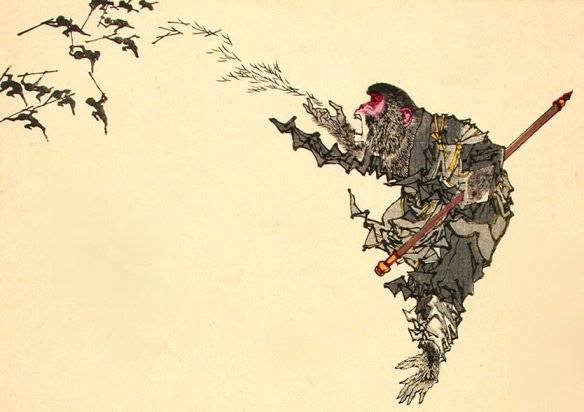What better way to end a rainy Easter weekend then with some homegrown entertainment? On April 5th In the House Festival offered just that with “Chasing the Monkey King.” There were three viewing periods over the course of the evening, at a house in East Vancouver. Guests who arrived early were invited into the hosts' transformed carport for tea. Glowing Chinese lanterns, crimson curtains, and trailing garlands of white Christmas lights created a fantastical setting in which to serve Oolong Ginseng and Phoenix Blend -- traditional teas with evocative names and pungent flavours, served by tea connoisseur Daniel Lui. The warmth and courtesy inherent in this act sharing of tea with strangers set the tone for the evening's entertainment, which was equally intimate and whimsical.
“Monkey King” is the story of Sun Wukong, a mischievous, trickster-like character from Chinese epics. In this telling of the tale, this monkey king is born of chaos from a cosmic egg. His exploits over the course of the evening involved learning the secrets of magic from a Taoist master; voyaging to the bottom of the sea to win gifts from the Dragon King; gaining immortality by use of his wiles; defacing the vaulted skies of Heaven with graffiti; and earning the Buddha's wrath (no mean feat) for which he is imprisoned under a mountain for five hundred years.
The tale is rich with imagery, from the “mountain of fruit and flowers” atop which the monkey king is hatched, to the heavenly feast of “unicorn liver, phoenix marrow, and immortality peaches,” on which he gorges, when left alone to guard the immortal's banquet table. The character of Monkey himself is a delight -- his egotistical, devil-may-care attitude leads him both to greatness and disaster. In the spirit of Raven, Odysseus, and every other mythic trickster before and after, the monkey king sews chaos and relishes adventure, knocking on the very gates of Heaven to demand an entrance.
Told by performer Chris Murdoch, the tale was accompanied by live-performance interludes. In the close confines of the curtain-decked living room, among floating candles and hanging parasols, musician Vi An entranced listeners with the fluid sounds of Chinese stringed instruments. Moody and delicate, her music drew listeners further into the sensual imaginary world of the story. A pause in the narrative allowed Chinese calligrapher Wai-Yin Lau to demonstrate his art. Each added an aesthetic layer to the story.
As the narrative drew to a climax, with the monkey king battling soldiers of heaven, the audience was led outside to a second story balcony. There, pint-sized eleven-year-old kung-fu champion Effie Chang did her best shaolin warrior/monkey king impression, executing an impressive series of flying kicks on the rainslick boards. As if this weren't novelty enough, the audience was led still higher, to the third-story widow's walk. There Master Yuan, of Shaolin Martial Arts, made a bold figure in saffron robes agains the blustery night sky.
These surprising moments highlight the magic that operated thoughout the evening – the element of surprise combined with the delight of traditional arts. The performers each showcased an ancient skill rooted in Chiniese culture. Woven into the context of the story they were unlike any entertainment or service that you might buy off the street, and could be seen for the rare, complex arts that they are.
As an aesthetic experience, “Chasing the Monkey King” was like peeking into a cabinet of curiosities – those 18th century collections of oddities and delights, from gemstones and seashells to stuffed birds and mechanical toys. If the evening suffered any lack, it was not of material but perhaps of time or suficient context to fully explore the richness of the individual arts that could be but sampled in a single evening.




